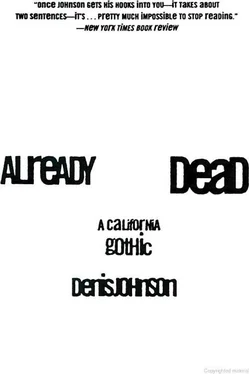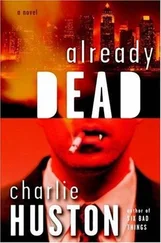“Lying by the water?” Frank asked.
“Hell yes.”
“Shooing the flies. Drinking drinks sideways.” Lally couldn’t stop the laughter in his mouth.
“I would like some cocaine,” Frank said. He turned his back and rested his arms out cruciform along the gutter of the pool and let his head fall forward. He extended his legs, and his bare feet floated up toward the surface some distance out beyond him.
“I could accommodate you,” Lally said, sensing they were on the brink of a situation here, “to a small degree.” Hillary comes along on the edge of reality in her bright Hawaiian mumu, doing something. God knows what she’s doing. More of the same.
“You left the gate open,” he told her.
“—”
Already Dead / 307
“I’m not ending up on TV dragging down the hall in baggy jail-house jeans.”
“—”
“Harry to Hillary,” he said.
“—”
“The crack in my ass showing on TV. The whole world looking.”
“—”
“This does not end with me doing Youth Christian Fellowship in prison. I’ll take a blaze of glory over that one.”
“—”
“Doesn’t she talk?” Frank dipped his head and sucked, puffed his cheeks, spewed water like a fountain.
Hillary frowned at this display, and they lost sight of her, as she had a trick of becoming invisible.
“She knows I mean it,” Lally said.
“She doesn’t talk anymore?”
“She doesn’t talk when my people are around. She’s got her own people.”
Suddenly Frankheimer ascended in a glitter, like a loose surfboard out of a wave. “Gotta go—”
“I’ll get your package,” Harry said.
They were moving out of the car and into their new home, formerly a saloon, now a sort of rectory for the West Point Holy Cross in the neighboring lot. Carrie took their things — mostly clothes — from green plastic trash bags, liberating dust and must, and laid them out in piles. “What’s this! — Oh Lord — Oh, my!” she said frequently, discovering possessions she’d forgotten.
Little Clarence watched through steady almost sedated-looking eyes, rolling a gray golf ball back and forth between his hands along the wooden flooring and in and out of the dimples made by piano legs.
The bar had been torn out — everything had been torn out, and in fact their quarters were very much as they’d been in the Dodge, only roomier.
“Don’t go too far,” she said.
He didn’t answer. Outside he was surrounded as everywhere these days by big evergreens. He went to the lot’s edge, by the narrow West Point Road, to bounce the golf ball on the pavement. As he understood it they wouldn’t live in the Dodge anymore, and tonight they’d 308 / Denis Johnson
go to Bible study. The ball tricked wrong and rolled away down the hill with a henlike muttering sound. Something brattled from the woods behind the one-room church, a beast or a bird or a party horn. Around the corner of the building trotted a cube-headed dog, faintly brindled and jowly and muscled, like a boxer, but smaller, and with blood on its muzzle. It ducked its head and approached, obsequiously writhing.
But when the voice called again the animal turned away and retraced its steps. Clarence followed. The dog had brought down a dappled fawn in the quiet wood and eaten most of its left hindquarter and was bent now, eager and friendly, gnawing at its hip. The fawn, laid out against a fallen log, looked elsewhere in abject repudiation of this circumstance. The dog turned to Clarence and said yeah yeah yeah yeah .
The fawn stretched its neck and rounded its mouth and bleated. Clarence selected a soft clot of earth and tossed it underhanded to burst on the dog’s flat forehead. The dog sneezed and stepped sideways. The boy tossed several others, a couple of which thumped against its ribs.
It crabstepped backward diagonally and stopped and waited, waggling its tailless rump.
Clarence went back to his new home and said to his mother, “There’s a deer that’s hurt.”
“Is that what I’ve been hearing?” she said.
“A dog is eating his leg.”
“Okay,” she said. She spent some minutes hunting for the machete before locating it finally under the car’s front seat.
“Behind there,” Clarence told her, and led her around back of the church.
“Oh, you poor thing,” she told the fawn. “I oughtta kill you too,” she warned the dog.
Clarence and the dog observed as she stood above the fawn and brought the blade down from high over her head with both hands.
“You’ll be sick tonight,” she told the dog. “Don’t worry,” she promised Clarence, “he’s gonna get a beating. He’ll diarrhea all over everything and his master’s gonna”—she leaned over the dog—“beat you like a dog .” The dog said yeah yeah yeah yeah .
“When will it be dead?”
“Don’t worry. Once they get hurt like that they stop feeling anything.
Look at its eyes. See they’re all cloudy? It’s dead.” For a little while Clarence traversed and circled the lot, striking at things on the ground with a short branch. The dog tagged along, Already Dead / 309
curious to begin with, and then fascinated. It nipped at the boy’s heels and then started biting harder and harder, as if it wouldn’t stop at the flesh but might continue, happy and friendly, on through the skin and never flag in its thorough approval until it ate through his rump as it might any downed fawn’s. Clarence threw the stick away and the dog went after it. Clarence escaped into the house. He found his mother seated on the floor under the window, crying for joy, with a stack of folded clothing in her lap. “We’ve been found,” she explained, and began laying out miscellaneous garments for his pallet.
It occurred to him he must be somewhere in the mid-western U.S. He walked along the interstate in the middle of the fields.
A blue MG stopped for him and he got in. They drove toward a patch of sun about six miles off.
Frank watched two domes in the distance. Or rather, his own knees, drawn up to the level of his eyebrows. The driver of this blue MG was smoking a horrible-smelling French cigarette.
“How you doing man?” the driver said. “You used to live with me but right now all I can remember is you used to get up every morning and say to your dog, ‘Don’t die on me, buddy.’”
“I don’t recognize you,” Frank said. “I don’t remember anything like that.”
“Oh yeah.” He pulled it around a tight curve and skirted the edge of a cliff high above the cymbal crash and slow, suspenseful grace of white spray over black crags: they’d reached California.
“I think you had a different name back then,” the guy said.
“I gotta get out of this car,” Frank said.
“You like the air. You feel like sleeping under the stars.”
“That and more,” Frank said, flinging himself from the little blue sportster while it was still rolling.
He walked through hot country full of long white grass and the flat shadows of oaks. He saw the fretwork of anything dead right through the scrub. Psychic radiology.
A woman let him into the only dwelling he came to. She was a hippie lady with her hair wrapped up in a scarf and a skirt so long it dragged on the floor. She hardly said a word, just let him walk into 310 / Denis Johnson
her place and sit down at the table by the sink. It was a double-wide mobile home in a time-chasm, with a nice paneled ceiling and picked-up furniture and stupid inexplicable stuff everywhere — crocheted HOME
SWEET HOME next to a KEEP ON TRUCKIN’ bumper sticker, diseased houseplants, fake flowers, toy rabbits, feathers and dried bones, a picture from a magazine taped up. Outside were the totally blank sky and the completely empty earth.
Читать дальше












